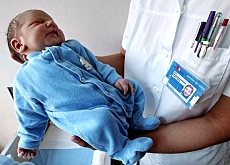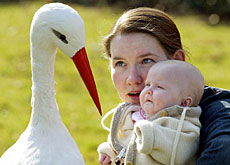House votes to lift ban on embryo screening

The House of Representatives has come out in favour of lifting a ban on screening human embryos for genetic diseases.
Thursday’s vote comes just weeks after it was revealed that a so-called “medicine baby”, conceived through in-vitro fertilisation in Belgium, had been born to a Swiss couple.
Parliamentarians voted by 92 to 63 to allow pre-implantation genetic diagnosis (PGD) under strict conditions. The cabinet will now have to draw up new legislation to be submitted to both parliamentary chambers.
At present Swiss law forbids almost all forms of PGD. It also outlaws the practice of selecting embryos so that the resulting offspring can provide transplant organs to sick siblings.
But Radical Party parliamentarian Felix Gutzwiller, who tabled Thursday’s motion, says it is time Switzerland lifted the ban on PGD. The procedure is permitted in many European countries including Britain, Denmark, Norway, France and Spain.
Gutzwiller, who is director of the institute for social and preventive medicine at Zurich University, argues that selecting healthy embryos would avoid the risk of a seriously ill child being born or a pregnancy being terminated.
The move is being opposed by the centre-right Christian Democratic Party, which believes any lifting of restrictions on PGD would lead to abuse and open the door to the creation of “designer babies”, selected for their sex or other characteristics.
“The idea of creating made-to-measure children is shocking and deplorable,” said the Christian Democrats in a statement. “A human being should not become a stock of spare parts. Pre-implantation diagnosis must remain banned.”
Moral issues
The issue of PGD is currently being examined by the country’s National Advisory Commission on Biomedical Ethics, which is due to publish its recommendations on the subject later this year.
But prompted by Thursday’s parliamentary debate, the ethics commission came out last week and said it was time to revise the law.
Its president Christoph Rehmann-Sutter told swissinfo that members were in favour of allowing PGD in certain circumstances, such as to diagnose severe hereditary diseases where a family carries a known genetic risk.
“It should not be mandatory but if a couple decides that they want to have this pre-implantation genetic diagnosis instead of becoming pregnant and then aborting the child, then we think in this case the state has no ethical right to forbid that,” he said.
Rehmann-Sutter added that it would also be “ethically sensible” to allow PGD in the case of in-vitro fertilisation, because of the high frequency of chromosomal aberrations.
Medicine babies
But he said members were reluctant to allow PGD to be used to select medicine babies. Their main reservation is “the instrumentalisation of a human being”, the idea of creating a baby as a medical tool to help another person.
He added that allowing medicine babies would also put moral pressure on all parents of sick children who could be saved with a selected sibling.
“We see strong reasons against, but that does not mean we are saying that parents who do it are immoral or are doing something wrong. It’s completely understandable that they would want to save their child,” said Rehmann-Sutter.
The commission says a revision of the law would also clear up a discrepancy that allows one form of PGD and not another.
Under current legislation, doctors cannot remove a cell from an embryo and carry out a genetic investigation on that cell.
Yet the law does allow genetic investigations to be carried out on egg cells, although this procedure only reveals diseases that are inherited down the maternal line.
swissinfo, Adam Beaumont
Pre-implantation genetic diagnosis (PGD) is banned in Switzerland, Germany Ireland and Switzerland.
Britain, Denmark, Norway, France and Spain allow the procedure under strict conditions.

In compliance with the JTI standards
More: SWI swissinfo.ch certified by the Journalism Trust Initiative

You can find an overview of ongoing debates with our journalists here. Please join us!
If you want to start a conversation about a topic raised in this article or want to report factual errors, email us at english@swissinfo.ch.